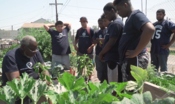Understanding the Americans with Disabilities Act


News of a Florida principal’s refusal to expand mandatory Holocaust education because he must remain “politically neutral” has been met with disbelief and anger. But it’s just an extreme example of a concern we hear all the time: Accusations of partisanship are used to pressure educators into silence on topics that matter. These resources are reminders that not every story has two sides—and it’s educators’ job to teach students the truth.
The Fourth of July is a quintessentially American holiday, but the celebrated right to liberty has never applied to every American. These resources can help you consider how July 4th fits into the complex relationship between the United States and its citizens of color and how you can bring this history and an important message to your diverse classrooms: There is no template for Americanness, and there never should have been.



When it comes to investing in racial justice in education, we believe that the South is the best place to start. If you’re an educator, parent or caregiver, or community member living and working in Alabama, Florida, Georgia, Louisiana or Mississippi, we’ll mail you a free introductory package of our resources when you join our community and subscribe to our magazine.